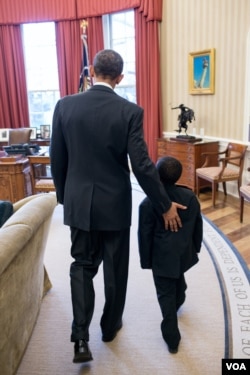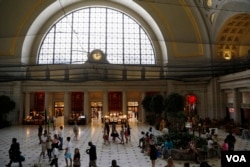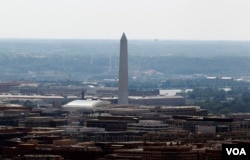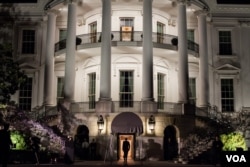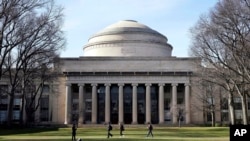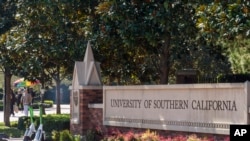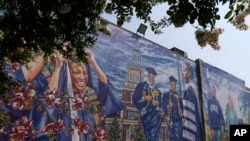Student Union
No, You Will Not Meet Obama in DC: Keith's Story
As we waited outside the international center for our taxis to arrive, up came Alex, dragging a large casket. “Good morning, guys?” he said, guiltily. He always had the air of a spy about him, and the dead body-sized case didn’t help. I rushed to open the large casket, grabbing the bag with my claws. I clipped it open and saw bags of Lays, Doritos and Oreos. “That’s my food for the next five days!” he said, smiling. “Oh! So where did you put the dead body...?” I joked.
I had brought only a small satchel, in which I’d stuffed three pairs of clothes and my tiny laptop. I planned on wearing the same socks until they smelled as bad as my excitement!
This would my first time leaving Rock Hill since I got to Winthrop in August. I was especially looking forward to the rendezvous I planned to have with President Obama. I had tons of stories to tell him about Africa. And I had stayed up all night, yawning and drooling on my desk, writing a sonnet for the occasion called “Yes We Can!”
We ended up in two taxis, crammed up in our seats, staring out as the sleepy town of Rock Hill slipped away in the rearview. Walgreens, Earth Fare, Bi-Low, B.P.
We took the taxis to Charlotte, where we boarded an Amtrak train to D.C. In my country I’d never travelled by train, in fact our trains were virtually dead. Most people travelled in kombis, or mini-buses; overstuffed with people, livestock, bicycles, and gossip. Public transport was a drag; full of endless stops by pot-bellied police officers soliciting for bribes; full of complaints about hardships.
I tried sitting next to Alex, so we could have some political discussions, but he soon fled like a fugitive saying, “You talk too much! You are annoying!” before slipping down the aisle, dragging his dead body. He sat next to a stranger who stared daggers at him on seeing the oversized suitcase.
A crazy lady sat next me. “When I get there, tell them I don’t want any trouble!” she shouted over her phone. “I just been in prison!! And I don’t want to go back coz o’ somethin' stupid! Are we clear!?” She hung-up. “So how’re y’a doing, darling?” she said to me, staring at me with sharp eyes.
After several hours, we finally got to Washington. We looped our way through underground trains before we were out in the open. “Wow!” I said, standing in front of everyone else. “D.C.’s quiet, and quaint!” It wasn’t quite the psychedelic D.C. I’d had in mind; an adrenaline-charged, action-packed metropolis with sirens, guns and excitement; it was something more elaborate. It was quiet. Peaceful. Nice!
D.C. is more of an administrative capital. Our own 7-story campus apartments looked elaborately taller than most of the buildings that I saw. But that is what made the city so spectacular! I felt like I was in a mini-city, a splendid Legoland stretching for eons. And was itching to explore!
After putting down our luggage at Hotel Harrington we found ourselves trotting across D.C., towards the White House, and I started to think about my rendezvous with President Obama, in the Oval Office. I would tell him how he is a symbol of hope, not only for Americans, but for people around the world; under the sea of flashlights, and news reporters. Then I’d hand him my poem, “Yes We Can!”
One of the girls we were traveling with was putting her enthusiasm for food to use with each new monument we passed. She licked the horses and fake people like ice-cream, making strange poses for the pictures she planned to post on Facebook.
“This one is going to be called Vanilla! That one Noodles... that one... I’ll tag all of you!..”
Alex, on the other hand hated the slow pace everyone else had adopted. He marched on like a soldier, staring ahead with his stoic eyes and probably thinking, “Those imbeciles! They get carried away by statues and rocks!”
We walked past herds of students who were also on spring break. They’d probably already bathed in the honor of seeing President Obama, I thought. Now it was our turn! It was our turn to see the maverick, with a million-dollar smile, and an infinite vision.
I held onto my poem. I felt it singing to me as I approached the White House.
“Excuse me.” said the guard. “You can’t go any further. The road is closed.”
I exclaimed in disbelief. “Does that mean...??? We can’t see the President?”
“I’m afraid so.”
I held onto the poem, and felt the weight of millions of prayers melting.
But, as I looked down at the Washington Monument, a tall obelisk staring into the heavens like a torch, I felt my hopes burning again. I was going to be in D.C. for the next five days, exploring the monuments. I was going to eventually give President Obama this sonnet, and let the prayers of millions of Africans sing along like a song. “Yes We Can!” echoed the sonnet in my hand.
It might not surprise you to find out that Keith did not get to meet President Obama on his trip. I asked him whether he really expected to be able to march into the White House and greet the president:
“I guess meeting Obama was somewhat between my overactive imagination... and an actual wish and hope. I feel silly in retrospect.”
Did it ruin your trip?
“I must admit not meeting the president did sort of ruin the trip in some way, because I was somewhat childishly hopeful. But I still found joy in the trip: seeing the monuments, eating in strange restaurants and trying sushi for the first time.”
Yes We Can, by Keith Mushonga
At the Summit of the White House you fly
Like an Eagle with wings open so wide
Your eyes see so far and beyond our sky
Guarding us like little chicks inside.
Before, It was a dream floating astream
When the world was thirsty for some hope
So our hope washed the dream, slowly downstream
And gave us more reason to sail the globe.
“Yes we can!” marched many in the streets
Packed up in podiums, with sorrows at hand,
Lost jobs lost health, all our rights in pitiful pits!
But then we marched twice to that same Summit
And found hope blooming like a blade of Wheat
Have you had any interesting travel experiences? Tell us about them in the comments, or use the form below.
Loading...
See all News Updates of the Day
US remains top choice for Indian students going abroad
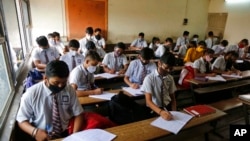
About 69% of Indian students traveling abroad for their studies chose the United States, according to a Oxford International’s Student Global Mobility Index. Other popular choices were the United Kingdom, Canada and Australia.
Education Times reports the main influencers for deciding where to study abroad – for Indian students and others – were parents. (April 2024)
Malaysian official: Schools can’t turn away from global tensions
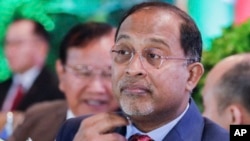
Zambry Abdul Kadir, Malaysia’s higher education minister, said protests spreading across universities in the United States show that schools can’t ignore political tensions.
Helen Packer, reporting in Times Higher Education, said the minister reminded educators that universities are key in the development of leaders, individuals and societies. (April 2024)
Social media breaks are difficult, but necessary

Between online classes, maintaining social connections and working on projects, college students can have a hard time disengaging from the demands of technology.
In Florida International University’s PantherNOW, Ariana Rodriguez offers strategies for taking a break from social media. (April 2024)
- By Melos Ambaye
Many master's degrees aren't worth the investment, research shows
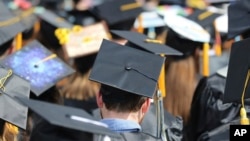
Nearly half of master's degrees have a negative financial return, according to new research by the Foundation for Research on Equal Opportunity, an economic research organization.
The study indicates that many graduate degree programs do not increase lifetime earnings enough to be worth it.
While 23% of bachelor’s degree programs yield a negative financial return on investment, 43% of two-year degrees and master’s degrees fail to deliver a return, according to the study by Preston Cooper, a senior fellow at FREOPP.
Cooper assessed the return on investment for 53,000 degree and certificate programs to determine whether a student’s lifetime earnings outweigh program costs and the risk of not completing their degree.
His findings show that a student’s field of study was the overriding indicator of return on investment at the undergraduate and graduate level.
Engineering, computer science and nursing bachelor’s degrees have high financial returns on investment, while programs in education, fine arts, psychology and English usually have low returns.
Graduate degrees in medicine and law tend to have strong payoffs. But a large share of master’s programs, including the MBA, frequently have low payoffs, according to Cooper.
Although workers with master’s degrees earn 16% more than those with only bachelor’s degrees, Cooper says the figure fails to account for students who had “higher preexisting earnings potential.”
“MBA students typically have high preexisting earnings potential, having often chosen high-ROI undergraduate majors such as finance and economics,” Cooper writes. “So the MBA adds little value on top of that.”
The study indicates that high starting salaries are predictors of high returns on investment. Degrees with starting salaries of $57,000 a year or more deliver the best lifetime returns.
But the return on investment of a degree can vary depending on the educational institution.
“Students interested in fields with low average pay can still find some schools that do well transforming those fields of study into high-paying careers,” Cooper writes.
The quality of an institution also matters, said William Tierney, professor emeritus of higher education at the University of Southern California.
“An MBA from Harvard is a likely ticket to a good job,” Tierney told VOA. “An MBA from the University of Phoenix, less so.”
But students pursue graduate programs for more than just financial reasons.
“Some degrees open up careers in fields that students may enjoy, such as in the performing arts,” Robert Kelchen, head of educational leadership at the University of Tennessee, Knoxville, told VOA.
“Others can help gain access to social networks or simply help students learn about a topic that is of interest,” Kelchen added.
Cooper told VOA that it might make sense for students in degree programs with low returns on investment to switch majors if they can still graduate on time.
He found the worst outcome for a student’s return on investment is dropping out of college “because they must pay for one or more years’ tuition and spend time out of the labor force.”
Lawmakers who fund higher education have a responsibility in ensuring “higher education delivers on its promise of economic mobility,” Cooper said.
Nearly a third of federal funding, including Pell grants and student loans, pays for higher education programs that fail to provide students with a return on investment, according to the study.
Cooper’s view is that “some schools should shut down low-ROI programs and reallocate institutional resources to programs with a better return.”
“There's definitely this narrative out there that higher education is always worth it, and you should always try to get that extra degree because it will increase your earnings,” he told VOA. “That's reinforced by colleges who make lofty promises regarding their graduate degree programs' outcomes, which all too often fall short.”
Harvard students end protest as school agrees to discuss Gaza conflict
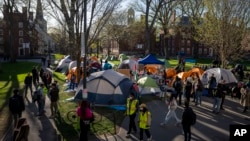
Protesters against the war between Israel and Hamas were voluntarily taking down their tents in Harvard Yard on Tuesday after university officials agreed to discuss their questions about the endowment, bringing a peaceful end to the kinds of demonstrations that were broken up by police on other campuses.
The student protest group Harvard Out of Occupied Palestine said in a statement that the encampment "outlasted its utility with respect to our demands." Meanwhile, Harvard University interim President Alan Garber agreed to pursue a meeting between protesters and university officials regarding the students' questions.
Students at many college campuses this spring set up similar encampments, calling for their schools to cut ties with Israel and businesses that support it.
The Israel-Hamas war began when Hamas and other militants stormed into southern Israel on October 7, killing some 1,200 people and taking 250 hostages. Palestinian militants still hold about 100 captives, and Israel's military has killed more than 35,000 people in Gaza, according to Gaza's Health Ministry, which doesn't distinguish between civilians and combatants.
Harvard said its president and the dean of the Faculty of Arts and Sciences, Hopi Hoekstra, will meet with the protesters to discuss the conflict in the Middle East.
The protesters said they worked out an agreement to meet with university officials, including the Harvard Management Company, which oversees the world's largest academic endowment, valued at about $50 billion.
The protesters' statement said the students will set an agenda that includes discussions on disclosure, divestment, reinvestment and the creation of a Center for Palestine Studies. The students also said that Harvard has offered to retract suspensions of more than 20 students and student workers and back down on disciplinary measures faced by 60 more.
"Since its establishment three weeks ago, the encampment has both broadened and deepened Palestine solidarity organizing on campus," a spokesperson for the protesters said. "It has moved the needle on disclosure and divestment at Harvard."




